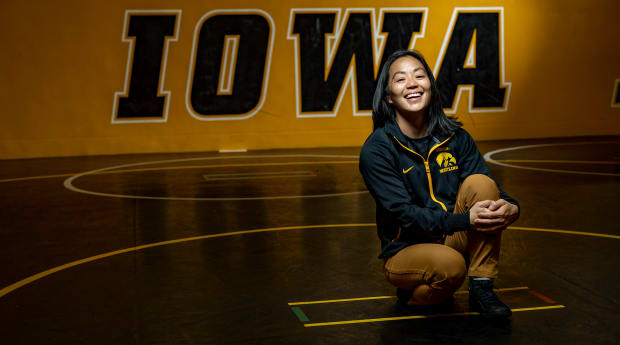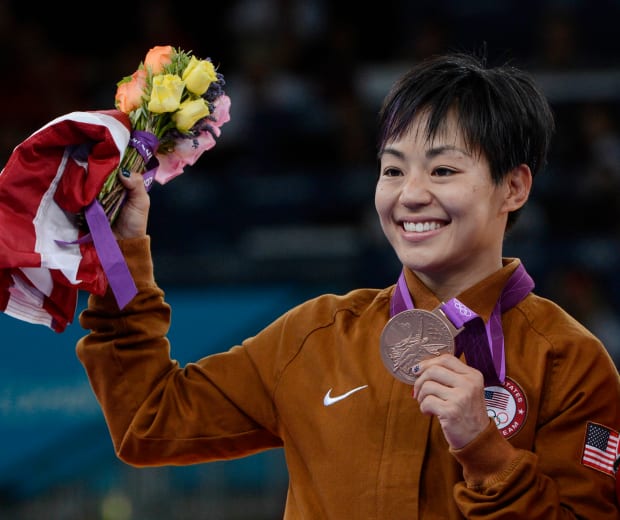Clarissa Chun typically tries to shy away from the spotlight. The head coach of Iowa’s first women’s wrestling team summarizes her illustrious wrestling career—which includes an Olympic bronze medal in London 2012 and a World Championship title—in about 90 seconds, and her response to the standing ovation she received upon being introduced to Hawkeye fans at a men’s wrestling meet was, “Oh gosh, this is wild!”
But she couldn’t evade her newfound celebrity status while attending the women’s wrestling national championship in May 2022. The young athletes who had traveled to Fort Worth for the meet flocked to her for a chance to speak to the leader of the first-ever Power 5 women’s wrestling program.
“I don’t even know if they knew my background athletic career,” Chun, 40, says with a laugh. “They see me as, like, ‘Oh, you’re the Iowa women’s coach!’ I’ve become known in a different way, and they want to meet because they want to wrestle at Iowa one day.”

Todd Rosenberg/Sports Illustrated
The interest in the program has been overwhelming, and Chun says her inbox is overflowing with countless messages from young women expressing their desire for a spot on her team. Her desire to build slowly by beginning with a small squad and NCAA scholarship limits mean she can’t extend an offer to every recruit, but she makes an effort to engage with the young wrestlers who approach her because she was once a teenage state champion with her eyes on Iowa.
As a junior at Roosevelt High School in Honolulu, Chun captured her first state title despite being a wrestling rookie. She was a five-time junior national judo champion but took up wrestling in 1998 when it officially became a sanctioned sport in Hawaii. She defended her crown the following year but says she “didn’t even think about wrestling post high school” because she didn’t know there was an opportunity to continue at the collegiate level.
A relic from her past, which she brought to Iowa from Hawaii after a trip home in March, recently reminded Chun of how her 17-year-old self envisioned her future.
In 1999, the State Senate of Hawaii presented Chun with a signed document celebrating the athletic and academic success she had achieved throughout high school. The final paragraph says that “her athletic accomplishments promise her a bright future at the University of Iowa. While majoring in Communications, she will also be eligible to pursue her career in wrestling at the NCAA level.”
At the time, Iowa didn’t have a women’s wrestling program, but the men’s team boasted 19 NCAA titles and Chun was hoping for any way in.
“I got accepted to the University, and I thought, ‘Maybe I’ll be a manager of the [men’s] wrestling program.’ Or maybe the coach would give me a space on the mat even though women’s wrestling wasn’t even a thought in their minds in 1999,” she says. “I think it’s funny how it’s come full circle.”
Chun ultimately accepted a scholarship to wrestle for Missouri Valley College, which was one of the first institutions to add a varsity women’s team. Now, 103 schools have women’s wrestling teams, and it has been added to the NCAA’s list of emerging sports for women, meaning that it can achieve NCAA Division I championship status if a minimum of 40 NCAA programs field varsity teams in the next 10 years.
It’s an encouraging step that Chun brings up when speaking to the media and her peers in the wrestling community. She often gets asked who her team will compete against, and her answer is always the same: “I’m hoping other Power 5 conferences. I’m hoping other Big Ten schools.”
“These young women want to compete against Michigan,” she says of her incoming athletes. “They want to fill arenas competing against Penn State.”

Michael Madrid/USA TODAY
Girls wrestling is also expanding rapidly at the high school level. According to the National Federation of State High School Associations, “the sport’s past five years of growth in participants and championships is greater than any other.” Currently, according to the same NFHS report, 31 states hold separate wrestling championships for girls, and the number of participants climbed to nearly 28,000 nationwide in the 2019–20 season.
For Iowa’s inaugural squad, Chun has recruited some of the top athletes from the growing pool of talent. Kylie Welker, the 2021 junior world champion, headlines a star-studded class that also features Nyla Valencia, who won the U23 title in the 50kg class at the 2022 U.S. women’s nationals.
Olympic silver medalist and six-time world champion Adeline Gray, who trained under Chun while she was working as an assistant coach for the U.S. national team, says her friend and former teammate will have an immediate impact that extends beyond Iowa to improve the sport overall.
“Women’s wrestling is a breath of fresh air for the wrestling community right now, and she embodies so much of that,” Gray says of Chun. “She’s going to be able to help navigate some of those pathways when it comes to balancing when the college career is really important and when it’s time to either step into that next realm of Olympic and World Championship focus or when to hold back a little bit to make sure it’s the right time. I think she’s going to have so much knowledge and be a great person to help guide those women to what their space is.”
With her new title as head coach, Chun is already showing young women in the sport the doors that are now open for them.
“For a commitment of mine, when I asked her what her goals are beyond the sport of wrestling, she felt like, ‘Oh, I can be a wrestling coach one day!’” Chun recalls. “That never crossed her mind before, but because I’m in this position, it gives them the opportunity to see their future if they want this path.”
Chun is already blazing her path to build the women’s program at Iowa, and fans can see her first team in action beginning in the 2023–24 season.







